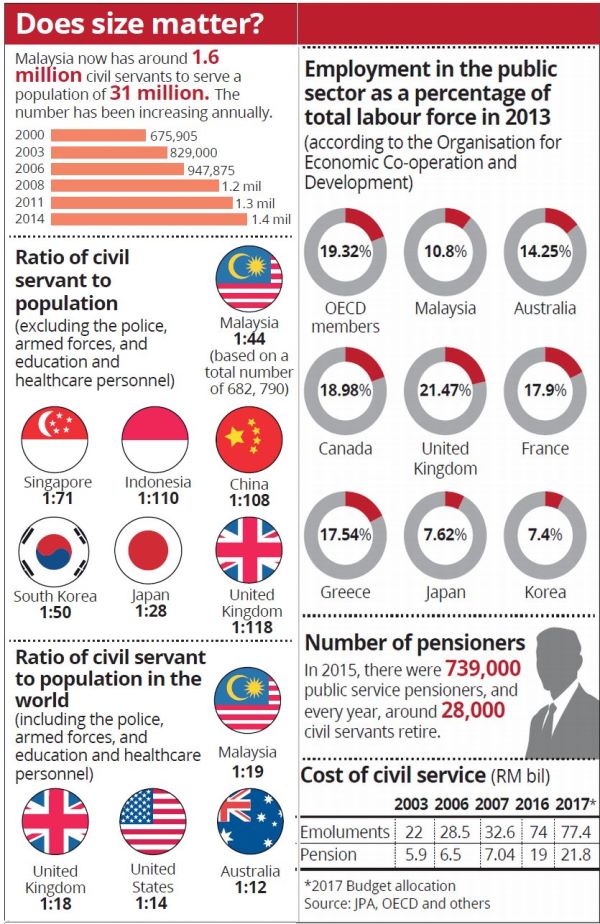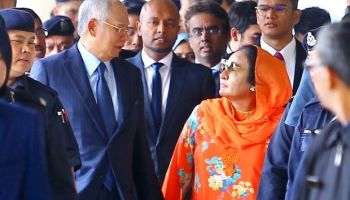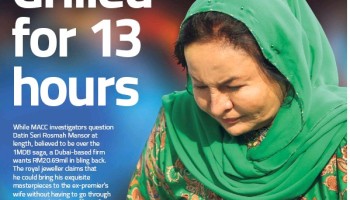 |
| Old politics: If the leadership keeps to the racialist, feudalist and
religious-centric tactics and policies of the past, thinking this is
what they need to do to keep the votes, it will just be the repeat of
past mistakes of the Umno era. |
Malays are powering the nation
WE refer to “The real Malay Dilemma” (
The real Malay dilemma: race, religion & politics./Sunday Star, Aug 26) by Siti Kassim. Siti’s rambling diatribe against Malay Muslims can be reduced to two baseless, provocative, insulting and defamatory allegations, namely:
1. Assimilation of Islamic values in governance is responsible for Malay backwardness and inability to compete with other races; and
2. Malays, constituting 60% of the population, are unproductive and parasitical, depending on the industry and labour of the remaining 40%, Chinese and Indians.
On the assimilation of Islamic values in governance, Siti questions whether “a Malay society, more insular and superstitious in thought... can compete on a fair footing with the rest of the Malaysian non-Muslim population.” She writes that Malays have been given preferred places in universities, GLCs and the civil service for over 40 years, resulting in “uncompetitive universities, a significant pool of unemployable Malay graduates and with most being employed by the civil service... failed GLCs and ...corrupt administration...” She asks if more religion would help and continues, “This has been the unintended consequence of the assimilation of Islamic values in governance.”
What evidence has Siti got to link the above allegations of Malay backwardness to the so-called Islamisation? Has she conducted any studies or consulted reports and research findings to come to that conclusion? Her claim is just hot air driven by prejudice towards Islam.
There has been no assimilation of Islamic values in governance as provided by the syariah. Having prayer rooms in government offices, teaching Islam to Muslim students in schools, broadcasting azan on TV or having an Islamic TV channel do not make governance Islamic. The Malaysian state is based on a constitution drafted by secular jurists and not on syariah. Most government leaders and top bureaucrats, products of Western education, are very much influenced by secular ideas and ignorant about Islam and its contributions to civilisations.
It is the separation of the moral from governance under a secular system that has facilitated the corruption, abuse of power, nepotism and cronyism of our government leaders and administrators. So, why blame Islam?
Siti condemns Malays as parasites. The Cambridge English Dictionary defines a parasite as a person who is lazy and lives by other people working and giving them money.
Siti writes that the majority of Malays are satisfied with their lives and carry on being religiously obsessed because they have been “able to live off the teats of the government in one way or another”.
She continues: “Thirty per cent to 40% of the population cannot sustain 100% of us. You need the remaining, at least majority, of that 60% (Malays) to be able to truly contribute economically and not be consumers of tax from the minorities. And religion is not an economic contributor. It is an unproductive consumer of epic proportions with no returns.”
Obviously, she has not heard of Max Weber’s The Protestant Ethic and the Spirit of Capitalism. To Siti, Malay businessmen, professionals, workers, farmers, fishermen, civil servants, police and soldiers do not contribute sales tax, income tax, road tax and other taxes payable under our laws. They are only “consumers of tax from minorities (Chinese and Indians)”. In other words, they are parasites. This is an insulting and provocative lie!
She claims that the transformation of Malaysia from an agricultural to an industrial nation with liberal economic policies was “powered by an industrious non-Malay population and the liberal segment of the Malay society”. She must have been blinded by prejudice not to see the role played by millions of Malay workers, engineers, surveyors, architects, policymakers and administrators in the industrial development of Malaysia.
Good public education and healthcare services are essential to becoming a developed industrial society. In 2016, Irina Bokova, then the Unesco director-general, praised Malaysia for “leading the way in South-East Asia in fostering inclusive and equitable education as the basis of sustainable green growth”.
And in his message on 2018 World Health Day, WHO regional representative Dr Lo Ying-Ru Jacqueline stated that Malaysia has been acknowledged globally for its high-performing health system based on a well-trained workforce, excellent infrastructure and quality service delivery.
Since independence, infant death has fallen by more than 90% to 6.7 deaths per 1,000 live births in 2016. Maternal mortality has also decreased by 89% between 1963 and 2013.
Who are these “well-trained workforce”? Mostly “unemployable Malay graduates” from “uncompetitive universities” and other institutions.
Who are the members of “the liberal segment of the Malay society” who powered the industrial transformation of Malaysia?
Are they those who are blond and advocating “separation of religion and government; religion must be a private matter and kept private; take out religious education from the public arena”?
Or those who call for recognition of homosexual, gay and lesbian rights; criminalisation of polygamy and decriminalisation of adultery; and free sex?
Sorry Siti, if there was any contribution from this deviant group, it was very minimal as many of them look to green pastures outside Malaysia and migrate. The rapid transformation of the Malaysian economy has been powered by patriotic devout Malay Muslims and the minorities, Chinese and Indians.
It is not the Malays who face a dilemma in engaging the modern world because their religion teaches them to seek success in this world and in the hereafter (Quran 2:201). It is Siti who faces a serious dilemma on whether to decolonise her thinking and become a true Malay Muslim or remain a Western secular clone.
By MOHD AZMI ABDUL HAMID President
Malaysian Consultative Council of Islamic Organization
Endorsed by:
Syekh Ahmad Awang, chairman, International Union of Muslim Scholars Malaysia
Syekh Abdul Ghani Samsudin, chairman, Secretariat for the Assembly of Ulama of Asia
Assoc Prof Dr Roslan Mohd Nor, secretary-general, Ulama Association of Malaysia
Datin Ustazah Aminah Zakaria, chairperson, Persatuan Persaudaraan Muslimah Malaysia
Hj Baharudin Masrom, secretary, Kongres Ummah
Dr Mohamad Ali Hassan, committee member of SHURA
Prof Dr Rahmatullah Khan, committee of MaSSa
Dr Abdul Rahman Ahmad, committee of SUARA
Datuk Abdullah Mad Din, former director of Islamic Division, Ministry of Education
Datuk Hadzir Md Zain, former deputy director-general, Implementation Coordination Unit, JPM
Elaborating the dilemma in today’s terms
I REFER to the comments from the Malaysian Consultative Council of Islamic Organization in response to my latest column “The real Malay Dilemma” (
The real Malay dilemma: race, religion & politics/Sunday Star, Aug 26).
Mine was an opinion piece. It seems the writer of the letter from the Malaysian Consultative Council of Islamic Organization and the characters endorsing it cannot differentiate between journalism and opinion. Having said that, whatever I say speak for itself.
Our former prime ministers Tunku Abdul Rahman, Tun Abdul Razak Hussein and Tun Hussein Onn were all secularists. Our present Prime Minister Tun Dr Mahathir Mohamad’s “Malay Dilemma” and what he continues to say today about how we Malays practise Islam still stands. I just elaborated the dilemma in today’s terms.
Is our Malay society not more insular or more superstitious than in the 80s? Ask yourselves. I won’t go into the nonsense and tahyul being preached on Malay sites that are popular today; let’s just look at the public universities that are managed and led by Malays. Did we use to have faculties in universities producing anti-hysteria kits or paranormal detection equipment or holding seminars on hell or how to interact with non-Muslims?
There’s a chief syariah judge proposing to have standard operating procedures for cases with “mystical elements”.
What is going on? Even in the 70s or 80s, such nonsense was unheard of among Malays leading our institutions.
Just reading the rants equating liberalism with perverts and everything to do with sex practically tells one of their mindset. They cannot escape from their dogmatic conservative religious notion of what makes a person a liberal.
They are intent on demonising liberalism so they can impose devoutness as they see it unto society.
Where were all these defenders of Islam and the Malays when our leaders were robbing the nation blind? Did we hear a peep from them?
I speak of leadership to change our society. I am so glad, in spite of the recalcitrant conservatives, that the Sultan of Selangor took the mantle of leadership and pronounced that the legal age of marriage be raised to 18 for Muslims. That is liberalism.
Only liberals have been calling for this to protect the childhood of our girls and to ensure they have the opportunity for education and a full life.
I am a Malay and a Muslim. I will speak up for the good of our society without fear or favour or intimidation. We need to face our demons and change to progress. Someone needs to tell the inconvenient truths.
By SITI KASSIM
National unity – an inconvenient truth?
Dear new government, if you continue to divide us, you will rue the day.
TWO events in recent days reminded me what is truly important to this nation.
The first was the National Day celebration on Friday in Putrajaya.
Although the euphoria over GE14 has waned, there was still enough to make me want to be part of the National Day celebration even if via my telly. So I did something I hadn’t done in years: got up early just to watch the parade.
The cameras at Dataran Putrajaya showed thousands of Malaysians who were more excited than me and had taken the trouble to line the thoroughfare to enjoy the spectacle and catch glimpses of members of the new Cabinet.
Indeed, it was deja vu to see Tun Dr Mahathir Mohamad as Prime Minister and Tun Dr Siti Hasmah Mohd Ali sitting with the Yang di-Pertuan Agong Sultan Muhammad V on the VIP grandstand.
It was also a touch surreal to see several faces we once thought impossible to see in such a setting – Cabinet members such as Datin Seri Dr Wan Azizah Wan Ismail, Gobind Singh Deo, Lim Guan Eng, Mohamed Sabu, M. Kulasegaran and Teresa Kok.
On the pavement, the opening and closing acts by flag-waving young Malaysians dancing in unison warmed the cockles of my heart.
I appreciated the effort to ensure all races were brought together to perform in a show of unity, emphasising the slogan: Sayangi Malaysiaku.
Yes, I do love my Malaysia, as do millions of others who were born and bred in this gracious, blessed land. That birthright is what unites us all.
And that is the key lesson to the well-being of our nation – unity.
Which leads me to the second event: the GE14-inspired movie, Rise: Ini Kalilah.
I caught it on Monday night and relived somewhat that incredible time when Malaysian history was made.
While not perfectly told and it is a story that only Malaysians can fully understand and appreciate, the movie has enough to keep its audience interested and it ultimately delivers the feel-good factor as it too reinforces the power of unity; that is, what can be achieved when enough citizens unite for a common cause.
Yet that power was never properly developed because it was politically inexpedient.
For its own political survival, especially after the 2008 GE, the Barisan Nasional government preferred to use race and religion to divide and rule the nation. That ultimately wreaked havoc on our interracial ties, as stated in local human rights group Pusat KOMAS’ Malaysia Racial Discrimination Report released in March this year.
National unity, as far can I can remember, was trotted out as important only after something bad had happened.
It took the terrible May 13, 1969, racial riots for the government to set up the National Unity Council.
The council was disbanded in 1971 and replaced by the National Unity Advisory Council, whose secretariats were the Department of National Unity and the National Muhibbah Office.
The two agencies were merged to form the National Unity Ministry in 1972. But it only lasted till 1974, when it was replaced by the National Unity Board.
The next time national unity took the spotlight was after GE13. The results showed the need to do something to reduce racial polarisation and to build a “united Malaysian nation”. That led to the formation of the National Unity Consultative Council in September 2013.
The NUCC held a series of meetings with agencies and NGOs to formulate a National Unity Blueprint. In 2014, it proposed three so-called Harmony Bills to replace the Sedition Act.
But the Act remained and the Bills became mired in controversy since they would make it mandatory for the government and all persons to promote equality and prohibit discrimination based on religion, race, birthplace, gender and disability. That was somehow anathema to the Malay agenda and the Bills went on the backburner.
It would appear the previous government saw the need for better national unity as an inconvenient truth and continued to use it for “display purposes only.”
So whither national unity in New Malaysia?
Political scientist Chandra Muzaffar, in criticising Pakatan for leaving it out in its election manifesto, wants the new government to make its stand known and emphasise the Rukunegara to show “it is serious and sincere about one of Malaysia’s foremost challenges but would have also demonstrated that it is crystal-clear about the direction we should take as a people.”
But others take a different view. Prolific online commentator T.K. Chua says: “What is the point of declaring unity as our goal when our policies, programmes and actions are doing just the opposite?”
He adds: “It is time to stop the endless declarations and slogans typical of a third world country. We can’t talk ourselves to national unity. National unity is the product of years of inclusive policies, programmes and actions.”
And that is what he wants to see in the Pakatan government – action, or in today’s jargon, walk the walk.
I take both views to be important: talk the talk and walk the walk. In our fractured nation, we sorely need to hear Pakatan leaders openly and loudly embrace national unity as a must-do KPI and then see them implement it in all their policies and actions for the long haul. Only then can we hold them to their words and judge them by their actions.
For now, Pakatan still seems dazed by its own victory and further stunned to find government machinery that Dr Mahathir says is broken.
If that is the case, Pakatan has the chance to rebuild the machinery that was abused by its predecessors and set it right. No more “divide and rule” but “one for all and all for one”!
By June H L Wong
Related posts:
 |
| Old politics: If the leadership keeps to the racialist, feudalist and
religious-centric tactics and policies of the past, thinking this is
what they need to do to keep the votes, it will just be the repeat of
past mistakes of the Umno era. | | | |

































